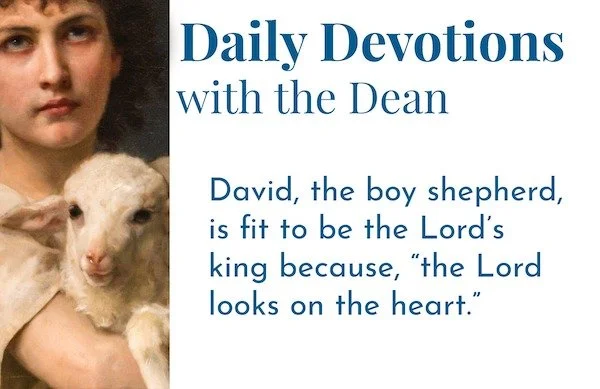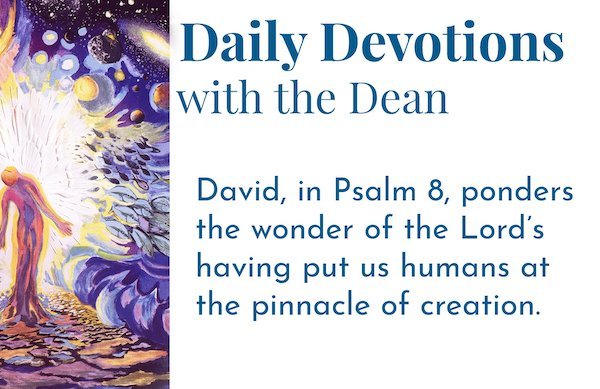Tuesday • 5/21/2024 •
Welcome to Daily Office Devotions, I’m Reggie Kidd, I’m glad to be with you on this Tuesday in the Season After Pentecost. We are taking a detour from the Daily Office readings for a few days. Instead, we are thinking through various facets of worship and how our Lord provides meaningful communion with him through our formal corporate worship as well as in individual worship in our daily devotions. The thoughts offered here are excerpts from articles I wrote for Worship Leader magazine a few years ago.
Singing the “Symbol”
“So say we all!” began as a fortunate ad lib by actor Edward James Olmos in his role as Commander Adama during a rally-the-troops speech in Syfy’s television series Battlestar Galactica. The line became a communal ceremonial affirmation of humans in their battle against the genocidal Cylons and in their galaxy-wide quest for a new homeland. Whenever I’d hear members of the Colonial Fleet raise the shout on their way to fight the Cylons, I’d recall from the book of Exodus the gathering on Mount Sinai. There, God’s people heard God’s Word and twice roared, “All that the Lord has said, we will do!” as they prepared for the covenantal sacrificial act and the meal by which God and his people bound their lives to one another (Exodus 24:1-11).
Singing: Bridge and Invitation
I have come to love many features of worship with friends who emulate early Christian worship. No feature more so than the way we bridge from the ministry of the Word to the ministry of the Table. Having heard the Word read and proclaimed, we use the Nicene Creed to voice our “So say we all!” Then, and only then, are we ready to pray for the needs of the world and to break bread in the presence of our God and King. Placed right there, the Creed invites us to “re-enlist” in a cause that is more momentous than war against mere cybernetic enemies and in a quest that is also more assured than Adama’s for a New Earth.
The Presbyterian church of my upbringing taught the baptismal creed: the Apostles’ Creed. But my Episcopal/Anglican friends use the church’s Eucharistic creed: the Nicene Creed. It spells out in greater detail the significance of Christ’s incarnation: that he who “for us and for our salvation came down from heaven and became incarnate” is “true God from true God.”
The Nicene Creed came to be called “The Symbol of the Faith.” It stood as the best summary of the truths for which Christians had to contend during the first half-millennium of the church’s existence (issues which have only become more urgent in the 21st century): the Savior had the authority to save because he was divine, and the ability to do so because he had become one of us.
Power of Song
What is not often appreciated is that for centuries (emerging as custom probably in the 4th century and becoming a matter of decree with Charlemagne in the 9th), it was normal for the Creed to be sung as part of the worship service. Because it was not merely recited, but sung, the Creed took on the features of a “national anthem” for citizens of the Kingdom of Heaven. These days, ordinarily when Protestants use the Nicene Creed, they simply recite it. Maybe that’s a loss (though on festival days at the Cathedral Church of St. Luke in Orlando, we chant the Creed in monotone, accompanied by improvisation on the organ).
Intrigued by the idea of singing it, and also because it’s embarrassing for me to have to read the Creed while all the cradle-to-grave Episcopalians around me say it from memory, I came upon plainsong chant versions in the hymnal, one in a minor key that feels a little like “O the Deep, Deep Love of Jesus,” and one in a major key that feels a lot like “Of the Father’s Love Begotten.”*
Three surprises: 1) how easy it has been to memorize the text as song; 2) how differently the two tunes nuance the text; 3) and most importantly, how having the chanted Creed in my being makes its truth sing in my soul.
Many Songs, One Voice
There are many ways to declare the faith in worship, from Martin Luther’s “A Mighty Fortress,” to Graham Kendrick’s “We Believe,” to Rich Mullins’ “Creed,” to the simplest affirmations of God’s goodness, like Darrell Evans’ “Trading My Sorrow” (“Yes, Lord, yes, Lord, yes, yes, Lord, Amen!”). We all have different settings … and different souls.
For all of us, though, there’s a power in how singing the faith anchors truth in us, augmenting what we know, re-focusing what we read, and shaping what we practice. There’s a Presence in how singing the faith binds us together, making us both His and one another’s. “So say we all!”
Be blessed this day,
Reggie Kidd+
* Respectively, S 103 in the Episcopalian Hymnal 1982, and S 361 in the Hymnal 1982 Accompaniment Edition.


















